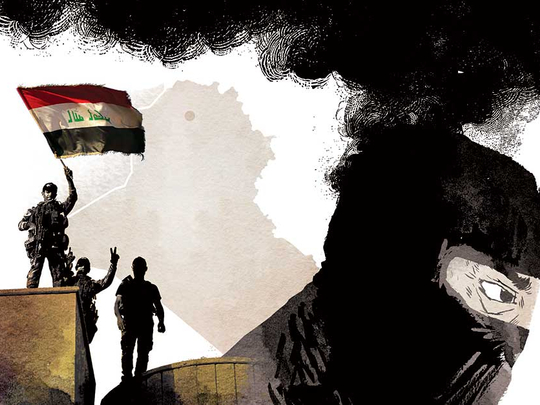
The Iraqi government struck a triumphalist tone when it announced the start, last Monday, of the long-awaited battle to retake Mosul. Prime Minister Haidar Al Abadi proclaimed impending victory as a varied array of forces with American and allied air cover began closing in on the outskirts of the city that has been under the control of Daesh (the self-proclaimed Islamic State of Iraq and the Levant) for the past two years. Preparations for the offensive were heavily publicised in the preceding weeks and official accounts of its progress in the first few days were resolutely upbeat. A successful outcome is deemed vital — not just by the Iraqi government, but also the United States administration — to give US President Barack Obama a victory with which to end his two terms in office and help fellow Democratic candidate Hillary Clinton to succeed him.
But wars have a habit of producing unintended consequences, especially in the Middle East. They may go to plan to start with, but invariably have unpredictable outcomes. Apparently easy military victories do not necessarily end up being sustainable or stabilising. There are exceptions and the Battle of Mosul could prove to be a true turning-point, but it would be irresponsible not to caution against over-optimism.
For one thing, Daesh is no ordinary enemy. It was underestimated by everyone when it built up its infrastructure in Iraq and Syria — along with a worldwide support and recruitment network — and rapidly took over large swathes of territory in both the countries, including Mosul in 2014. Since then, it has been subjected to unrelenting air strikes and severe setbacks on the ground by a coalition of 60-odd nations led by the US. Yet, it would be a mistake to underestimate it.
Daesh has been expecting and bracing for the battle of Mosul for the past two years. It has prepared elaborate defences, including networks of trenches and tunnels, mined and booby-trapped approach routes and readied truck-driving suicide-bombers to halt advancing troops. Its fighters are more than willing to die — and those remaining in Mosul are among its most committed — and will not surrender. They will seek to make the battle costlier for the attackers than the defenders, who enjoy a natural advantage in any case, regardless of the suffering caused to the civilian population. If, as some reports claim, they have access to chemical weapons, they will not hesitate to use them, as they have nothing to lose.
Mosul means much more to Daesh than the other Iraqi cities it has lost in recent months, such as Fallujah, Tikrit or Ramadi. Its loss will mean the loss of its last stronghold in Iraq and probably lead to the fall of its Syrian ‘capital’ Al Raqqa and the demise of its self-proclaimed ‘Caliphate’.
Yet, the fall of Mosul is no more likely to spell the end of Daesh as an organisation than the fall of Kabul in 2001 spelled the end of the Taliban. The latter experienced a rebirth after their short-lived rule in Afghanistan was ended. Expulsion from Mosul, and possibly Al Raqqa, could have a similar effect on Daesh. It will relieve it of the burden of administering its former territories under relentless air strikes and a suffocating siege. Its thousands of surviving fighters could pose an even greater threat if they went underground and focused on terrorism to exact revenge against their enemies, whether in the region or in the West.
Other uncertainties about the outcome of the battle of Mosul relates not just to Daesh but to the forces lined up against it. Some 5,000 US troops are taking part in the offensive, mostly Special Forces directing operations on the frontlines or selecting targets for air strikes by American and allied warplanes. But most of the fighting on the ground will be done by Iraqi forces numbering some 60,000 in total: Including army and security units — the mostly Shiite Popular Mobilisation Forces, other largely Sunni national and tribal volunteer militias and the Kurdish Peshmerga fighters. A variety of regional powers are also invested in the assault, not least because of the spill-over effect it will inevitably have in neighbouring Syria.
But these parties have competing and often conflicting agendas. Even if they are now making common cause against Daesh, and their combined efforts eventually succeed in overrunning its main stronghold, many questions will remain about the aftermath.
The Iraqi Kurds — America’s favoured allies and proxies in the fight against Daesh — have exploited the campaign to expand the territory under their control. They have said they will not give up the additional gains they have made during their advance on Mosul. They scarcely conceal their aspiration to secede from Iraq and to adjust the demography of contested areas. So can their current alliance of convenience with Baghdad survive?
Moreover, the risk of a sectarian conflict being reignited by the attack on Mosul is real. Al Abadi has sounded sensitive to this, speaking of the need to create a ‘different Iraq’ and avoid repeating the mistakes that had led to the emergence of Daesh in the first place. This is commendable indeed, but it remains to be seen if these wishes will be translated into practice and whether the battle for Mosul will usher in a new phase of sectarian cohabitation in Iraq or one of conflict.
Abdel Bari Atwan is the editor-in-chief of digital newspaper Rai alYoum. You can follow him on Twitter at www.twitter.com/@abdelbariatwan.












